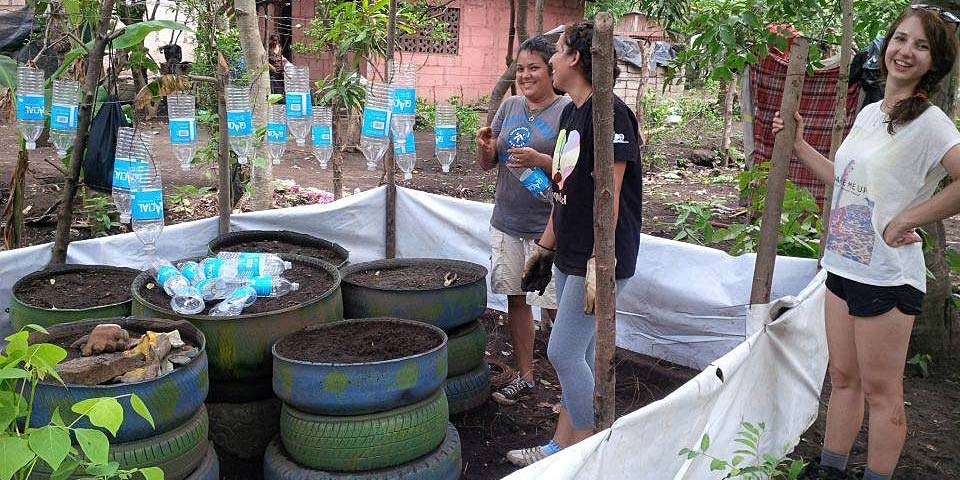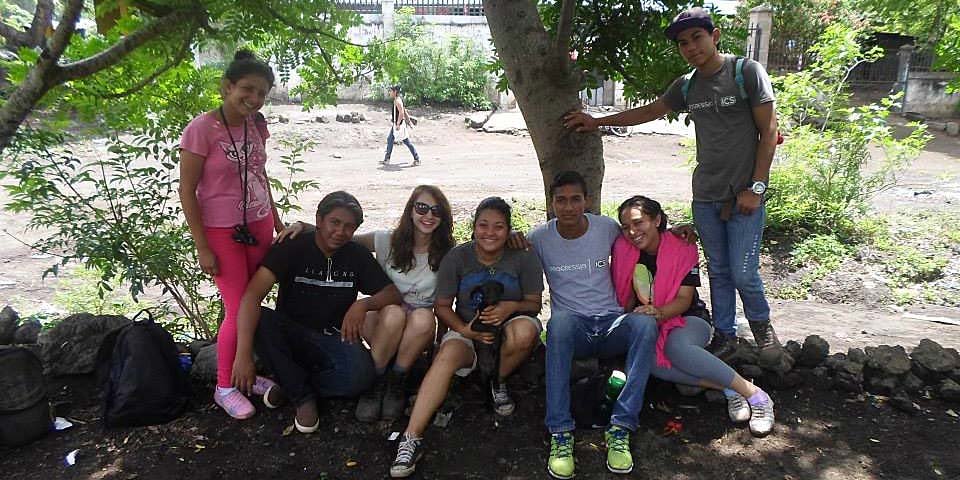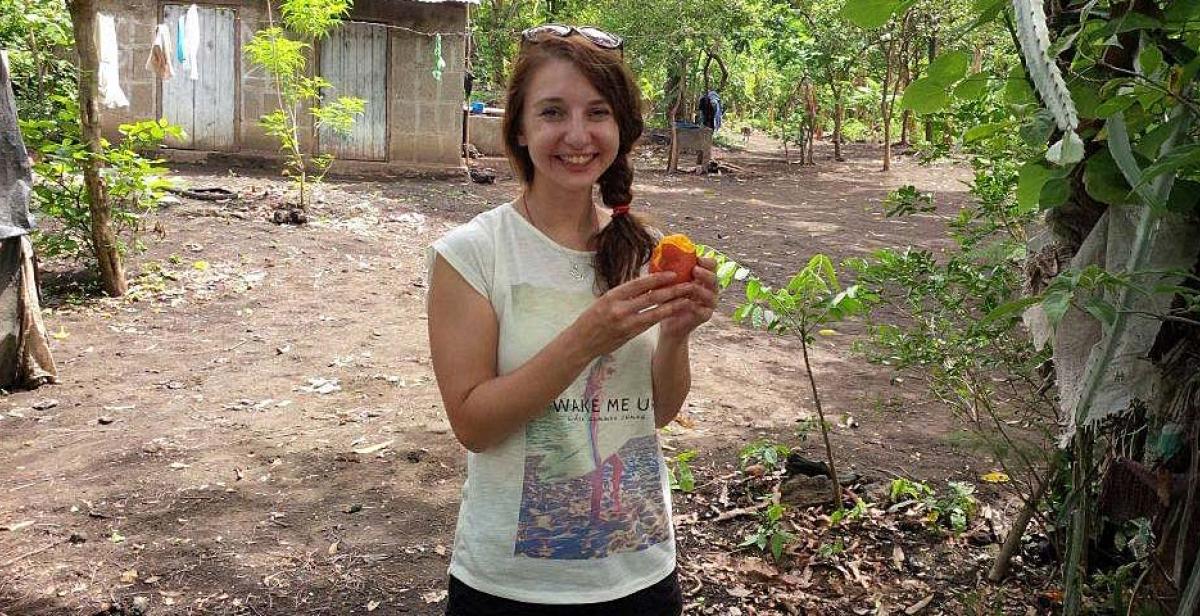Introduction
‘Chiche!’ is a word I learnt recently in Nicaragua. It means ‘piece of cake!’ and has to be my all-time, hands-down favourite word that I have learnt here (and I have learnt a LOT of new Spanish words).
Even saying the word itself is enjoyably effortless. (Go on, you simply have to try saying it out loud now!).
However, I am aware of how ironic it is that ‘Chiche!’ is my favourite word out here as this project has, of course, been anything but a piece of cake.
At times, it was more like carrying a heavy bucket of ____ (insert any of the following; concrete/sand/soil/rocks/tools) in the sweltering summer heat. Uphill. In a community I nicknamed ‘hotter than the sun’ as it is situated on the doorstep of an active volcano.
However, carrying this weight made me stronger.
Challenges and a steep learning curve
It is because of the challenges we faced on our ICS project that I have been able to grow so much both personally and as a Team Leader. I am going to explore this development through three of the most popular ‘interview buzzwords’; communication skills, time management, and teamwork. I had been working professionally for three years prior to this experience and already considered myself strong in all of the above areas. In fact, I think most graduates would say the same. But ICS taught me we can always learn more and develop our skills in these areas (as well as others). We should never become complacent, and we should always remain humble as to what people from different cultures (or even our own) can teach us.
It was always going to be difficult when both the Nicaraguan Team Leader and I couldn´t speak each other’s languages. But if this challenge hadn’t existed I wouldn’t have been able to strengthen my communication skills. This area was definitely one of my greatest strengths before coming to Nicaragua but still I was taken aback by how ridiculously frequently miscommunications could occur when the Team Leader and I could not talk to each other with fluency. These miscommunications were only over minor issues (how to make something, who was working on what, what tools we needed, etc.) but they still slowed our progress down. One of the main ways to counteract this was of course for me to learn more Spanish (our main language of communication) but as I was doing this, I also learned two important lessons. Firstly, I learnt to become a better listener and, secondly, I learnt the importance of being like a river when you communicate (choose the easiest path to express what you mean!).
Being forced to slow down my communication with others (due to a language barrier) and constantly checking in to make sure we had understood each other, made me realise how often, under pressure in the workplace, we tend to rush our communication with others. Often when we are communicating with someone (even in the same language) we tend to draw our own conclusions too rapidly. The biggest lesson I have learnt out here is that if we are not truly listening to what the other person is saying, we might as well be speaking two different languages.
It was always going to be difficult when we were given a totally new project to manage, in a brand new community. But if this challenge hadn’t have existed, I wouldn’t have learnt so much more than I already did about time management and prioritisation. In an office job where you have a particular role and set of responsibilities, it is not too difficult to excel in these areas. Your organisation has been established for a while and thus has already defined its goals. But in the world of development, you look around and see how much there is to do, and how little time… How do you decide where to start? In our case, we were originally supposed to be making vegetable patches for 15 agriculturist families. However, upon visiting them our technical advisory organisation OrgaNica realised that these families were medium-scale farmers. It was a difficult decision for OrgaNica who then had to say ‘no’ to these families, because their vision was to help very poor families to become small-scale farmers. Although this was the right decision, it still took up a lot of time at the start to make sure the project aligned with our goals. In the end, we needed to conduct a survey from scratch to identify the 15 families most in need. Unfortunately, this survey still wasn´t able to completely identify the types of families we were looking for, so we also needed to turn to the community leaders for advice. All in all, this process took around 1.5 weeks and we couldn’t believe how long it had taken us just to find the families! However, I am grateful for what this experience has taught me. When you try something new, you will make mistakes and time will be wasted and it will be so frustrating. But being able to look at these mistakes as important lessons, and then plough forward, making the most of the time you do have, is a very important part of time management too.

It was always going to be difficult for team morale when all of the above things happened (combined with life in a new country, away from your regular support network) but I am grateful for these experiences because it taught me some very important things about teamwork. It is important to be able to be honest about what went wrong as a team, so we can reflect and make the necessary changes. But just as important, is to be the voice that helps your team bounce-back, and as fast as possible, from these setbacks. I noticed several different members of the team take on this role over time, and saw what a difference it makes. Just one positive thought, despite a set of negative circumstances can become contagious! I hope I can always try to be this voice in the future.
How my worldview changed
All of the above experiences gave me a deeper insight into and empathy for the types of problems that NGOs, as well as our world leaders, face every day. There are so many issues in our world today that all need addressing simultaneously - the environment, health, water, poverty, the economy, education, and so on. I have a deeper understanding now of how hard it is for countries to know where to start. Our world leaders are going to make mistakes. Communication between different cultures and languages is ALWAYS going to be difficult. Progress is ALWAYS going to be slower whenever we try something new. And it follows that when communication is difficult and progress is slow, people all over the world are bound to feel disillusioned at some point.
What ICS can do is teach young people the essential communication, time management and teamwork skills needed to tackle these problems as effectively and efficiently as possible. Moreover, it can teach them to face the inevitable frustrations with equanimity and patience as they move forward in their lives, and one day become adults of influence. ICS is not just about the 12 weeks you spend in-country. It is about the life you lead afterwards.
Cultural exchange: What Nicaragua taught me about solidarity
The most important way that all ICS volunteers will experience personal development is through the cultural exchange. One of the most poignant experiences I had here in Nicaragua was a few days ago, when the secretary of our partner organisation passed away. My host mother asked me and the other volunteers to come and pay our respects to the family. Although the volunteers and I agreed to go, we all felt slightly uncomfortable at the thought of expressing our sympathies to a woman we had never met, on the same day she lost her husband (all I could hear were typical British courtesies running through my brain such as ‘she needs her privacy’ and ‘don’t you think she might want some time alone…?’). But, nevertheless, we went and the scene that greeted us left us all feeling humbled. There were hundreds of people sat in chairs outside the house of the family who had lost a father, husband, son. In just a few hours this small community had organised refreshments, two marquees, hundreds of chairs and a small band…all to show this family that they were not alone. Contrary to our expectations, the family seemed truly grateful when we went inside to greet them and express our sympathies. I have never seen such a vivid example of solidarity.

More than anything, this is what ICS has taught me, and what I hope by sharing this story, that a tiny, developing country like Nicaragua can teach us in the developed world. That in life, sometimes simply the best thing we can do is stand together, even in the face of challenges and questions we don’t have the answer to.
Written by ICS Alumni Team Leader Lara Marie Money (April - June 2015 cycle, Nicaragua)



